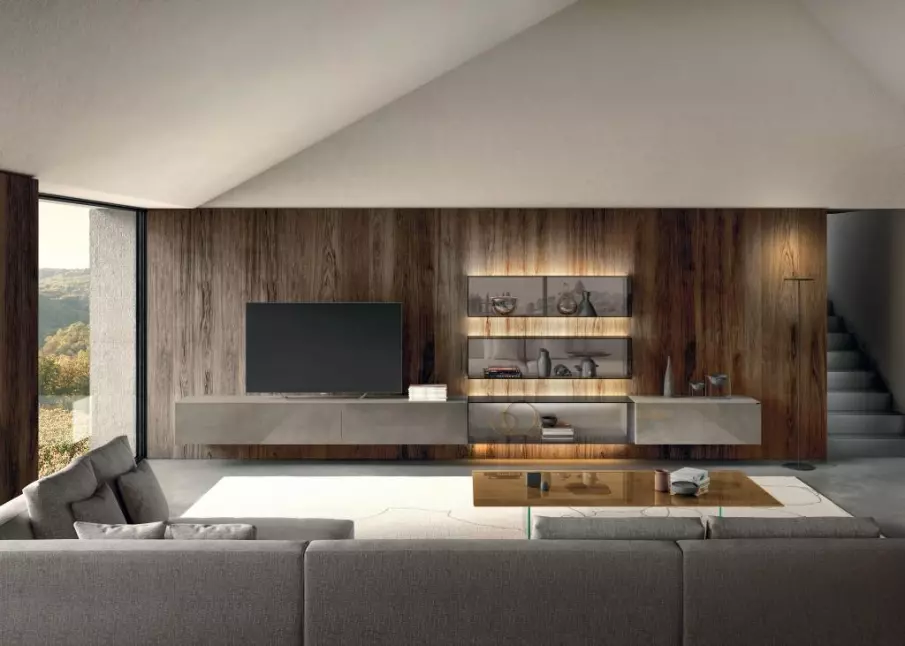The art of modularity: flexible furnishing solutions with Italian design

In a constantly evolving world, modularity emerges as a smart response to the changing needs of living spaces. Interior design is not exempt from this trend, offering flexible solutions that allow for easy adaptation of layouts according to circumstances.
Italian design, renowned for its elegance and functionality, perfectly incorporates this approach, offering modular furniture that combines refined aesthetics with practicality. These creations provide an ideal solution for those looking to combine style and flexibility in their living spaces.
What is modularity in interior design?
Modularity in interior design refers to the ability of furniture and decorative elements to be reconfigured or adjusted according to the user's needs and preferences. This concept, which appeared in the mid-20th century, aims to maximize the efficiency and versatility of living spaces, allowing for quick adaptation to different situations.
Unlike fixed furniture, modular pieces offer unparalleled flexibility, making a multitude of configurations possible. This innovative approach is particularly appreciated in urban environments, where space optimization is essential. Moreover, it allows individuals to express their creativity by constantly reinventing their interiors without having to invest in new furniture.
The advantages of modular furniture
Modular furniture offers numerous advantages that perfectly meet the demands of modern spaces. Its main asset lies in its flexibility, allowing users to easily adjust their interiors according to their changing needs. For example, a modular sofa can be reconfigured to accommodate more guests or create an intimate relaxation space.
In terms of space optimization, modular furniture proves to be particularly effective. It allows intelligent use of small spaces through ingenious storage solutions and multifunctional configurations. In larger rooms, it helps to delineate different functional areas without resorting to fixed partitions, thus offering fluidity and visual continuity.
Another major advantage is customization. Modular furniture allows for the creation of unique, tailor-made configurations that reflect the tastes and lifestyle of each user. This ability to personalize goes beyond aesthetics, offering practical solutions that meet the specific needs of everyone.
Finally, the mobility of modular furniture facilitates their movement and rearrangement. It can be easily dismantled and reassembled, which is particularly useful for those who move frequently or enjoy regularly reinventing their living space.
Modularity and Italian design
The art of modularity finds a particularly elegant and functional expression in Italian design. By incorporating this concept, artisans manage to combine flexibility and refinement, creating furniture that meets modern needs without sacrificing aesthetics.
Italian modular furniture stands out for its ability to transform spaces while maintaining a harmonious appearance. For example, a modern wall unit can be adjusted to offer storage according to needs, while perfectly integrating into various interior decoration styles.
The materials used, such as solid wood and high-end finishes, ensure not only durability but also timeless elegance. Moreover, technological innovations allow for the integration of additional functionalities while maintaining a sleek design.
Thus, modularity in Italian design is not just practical: it also brings a touch of sophistication and charm to any interior, transforming each space into a unique and welcoming place.
LAGO: modular furniture Made in Italy that combines style and sophistication
Founded in 1976, LAGO is an Italian company recognized for its expertise in Made in Italy design, offering sophisticated and elegant furnishing solutions. Its product range includes an exclusive collection of high-end furniture, famous for its modular and modern design.
LAGO's innovative approach is rooted in the late 19th century, relying on artisanal know-how passed down from generation to generation. In 2006, under the direction of the fourth generation, the company took a major step by entering the international stage.
In addition to offering distinctive design, LAGO has adopted an innovative communication strategy focused on digital. Under the impetus of Daniele Lago, a young entrepreneur, the company places culture at the heart of its development strategy. Today, LAGO is present in more than 20 countries and has established a solid network of over 400 selected stores.
The furniture from the LAGO collection is designed to integrate harmoniously into various environments. Durable and of high quality, it is distinguished by clean lines and timeless design. Offering great customization and flexibility, these pieces meet the varied needs of users. Guided by strong values, LAGO sees design as a powerful tool for social transformation. Sustainability is central to its philosophy, with a constant commitment to using eco-friendly materials at every stage of production.
With a growing community, LAGO also invests in improving its digital ecosystem. In 2023, the company launched a new website aimed at offering an inclusive and personalized user experience. This site also aims to reduce costs and CO2 emissions, thereby reinforcing LAGO's commitment to a sustainable approach in its digital activities.
More to Read:
Previous Posts:











